By Casey Corridor
SHANGHAI (Reuters) – Since Tera Feng began documenting her enviable Shanghai life-style, together with visits to artwork galleries and trend occasions on Chinese language social media eight years in the past, she has constructed up a following of greater than 500,000 folks.
Whereas that could be a drop within the huge ocean of China’s shopper market, Feng and types she works with have discovered her viewers – primarily financially unbiased city Chinese language girls – is prepared to spend.
A latest swap to livestream promoting on social media platform Xiaohongshu three months in the past has seen Feng promote every part from a 15,000 yuan ($2,060) Carven swimsuit to her favourite model of rice that prices 60 yuan for a 1 kg bag.
Xiaohongshu, typically in comparison with Instagram, has lengthy been considered one of China’s most necessary advertising and marketing instruments. It has made a number of e-commerce pushes over the previous decade with out a lot success.
However now, consultants say manufacturers, particularly these peddling area of interest and high-end merchandise, are lastly seeing gross sales breaking by way of this yr amid a troublesome retail surroundings.
Whereas retailers have been pressured by penny-pinching customers into heavy discounting on different e-commerce platforms reminiscent of Alibaba (NYSE:)’s Taobao and PDD Holdings’ Pinduoduo (NASDAQ:), Xiaohongshu’s give attention to aspirational life is attracting much less price-sensitive customers.
“Manufacturers actually worth a following on Xiaohongshu, as a result of the consumption energy is completely totally different” to different platforms, mentioned Suya Wang, normal supervisor at Early Knowledge, a Shanghai-based consultancy.
Whereas some manufacturers together with L’Oreal and Tapestry (NYSE:)’s Coach have opened their very own shops on the platform, many manufacturers are additionally investing in partnerships with influencers who livestream choices of merchandise from a number of manufacturers and classes.
“There’s a higher likelihood of us being found by the appropriate customers as a result of that is the place folks go to analysis female-oriented life-style merchandise,” mentioned Melody Zhao, an investor in interval care model Enya. Xiaohongshu e-commerce shall be a precedence for the model’s market entry early subsequent yr, she added.
Xiaohongshu was late to the livestream gross sales increase in China led by Alibaba’s Tmall and ByteDance’s Douyin, however in 2022 it mixed its e-commerce and livestreaming divisions, incorporating buying capabilities into livestreams.
Influencers livestreaming on Xiaohongshu are likely to make use of a quieter, conversational tone when chatting with viewers, setting themselves aside from fast-talking, high-energy hosts on different platforms that use aggressive gross sales techniques.
Ian Hylton, president of Ms Min, an unbiased Chinese language designer model which sells knitted sweaters priced at over 5,000 yuan, mentioned they have been caught off guard by a sudden development in Xiaohongshu gross sales after being featured in a livestream hosted by Chinese language actress Dong Jie.
“We by no means approached Xiaohongshu as a promoting platform, it was a spot to inform our tales and to boost model consciousness,” he mentioned. “However when Dong Jie talks about Ms Min, we are able to promote a whole bunch of models of an merchandise following a single livestream,” Hylton mentioned.
Ivan Gu of Magic Promoting, an company that manages the social media and e-commerce operations of luxurious manufacturers, mentioned plenty of his purchasers, together with Max Mara and LVMH, have been trying extra significantly to Xiaohongshu as a gross sales driver.
Plans, nonetheless within the works, embody opening shops and operating extra livestreams, or organising model gross sales associates as livestream hosts on the platform, a phenomenon generally known as KOS – or key opinion gross sales – in China.
‘TRIPLE DIGIT GAINS’
Xiaohongshu, whose identify interprets to “little purple guide”, is just like Meta (NASDAQ:)’s Instagram in that it permits customers to curate photographs, movies and textual content documenting their lives. In recent times it has additionally turn out to be a de facto search engine for younger girls in search of journey suggestions, anti-aging lotions and restaurant suggestions.
The corporate, a privately held agency with over 300 million customers and a reported valuation of $17 billion after its newest funding spherical in July, declined interview requests from Reuters and didn’t reply to questions relating to its gross sales income. Hongshan (beforehand Sequoia China), Hillhouse, Boyu, and Citic Capital are all amongst Xiaohongshu’s buyers.
Xiaohongshu has stayed largely quiet about its e-commerce technique however Jacob Cooke, CEO of e-commerce consultancy WPIC Advertising and marketing + Applied sciences who works with manufacturers trying to be a part of the platform, mentioned it has been hiring workers away from rivals Alibaba and ByteDance’s Douyin in an indication of its ambition.
“We’re anticipating triple digit beneficial properties in Xiaohongshu’s GMV (gross merchandise quantity, a measure of gross sales) subsequent yr,” Cooke mentioned, estimating the platform will prime $100 billion in gross sales income in 2025.
Others nevertheless, say that Xiaohongshu will seemingly stay area of interest as a e-commerce participant and never an actual risk to bigger platforms.
Tmall, JD (NASDAQ:).com and Pinduoduo, China’s prime three platforms, account for greater than 90% of the nation’s $2.78 trillion in GMV, in response to information consultancy Syntun.

“In contrast with massive platforms, their GMV is just too small and they also do not have substantial platform affect,” Beijing-based tech and e-commerce analyst Li Chengdong mentioned.
($1 = 7.2768 renminbi)



